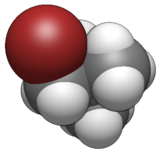1-Bromo-2,2-dimethylpropane
Appearance
(Redirected from Neopentyl bromide)

| |

| |
| Names | |
|---|---|
| Preferred IUPAC name
1-bromo-2,2-dimethylpropane[1] | |
| Other names
Neopentyl bromide
| |
| Identifiers | |
3D model (JSmol)
|
|
| 1730989 | |
| ChemSpider | |
| ECHA InfoCard | 100.010.121 |
| EC Number |
|
PubChem CID
|
|
CompTox Dashboard (EPA)
|
|
| |
| |
| Properties | |
| C5H11Br | |
| Molar mass | 151.047 g·mol−1 |
| Appearance | colorless liquid |
| Density | 1.199 g mL−1[2] |
| Melting point | −105.5 °C; −157.8 °F; 167.7 K |
| Boiling point | 105–106 °C; 221–223 °F; 378–379 K |
| Hazards | |
| GHS labelling: | |
 
| |
| H225, H315, H319, H335 | |
| P210, P233, P240, P241, P242, P243, P261, P264, P264+P265, P271, P280, P302+P352, P303+P361+P353, P304+P340, P305+P351+P338, P319, P321, P332+P317, P337+P317, P362+P364, P370+P378, P403+P233, P403+P235, P405, P501 | |
| Flash point | 6.7 °C; 44.0 °F; 279.8 K |
Except where otherwise noted, data are given for materials in their standard state (at 25 °C [77 °F], 100 kPa).
| |
1-Bromo-2,2-dimethylpropane, also known as neopentyl bromide, is an isomer of bromopentane. It is a colorless liquid.[2]
References
[edit]- ^ "1-Bromo-2,2-dimethylpropane". PubChem Compound. USA: National Center for Biotechnology Information. 26 March 2005. Identification. Retrieved 29 December 2023.
- ^ a b "CAS 630-17-1 1-BROMO-2,2-DIMETHYLPROPANE". Alfa Chemical. Retrieved 29 December 2023.
Extra reading
[edit]- Whitmore, Frank C.; Wittle, E. L.; Harriman, B. R. (June 1939). "The Preparation of Neopentyl Iodide and Neopentyl Bromide". Journal of the American Chemical Society. 61 (6): 1585–1586. doi:10.1021/ja01875a072.
- Lisowski, Carmen E.; Duncan, Juliana R.; Ranieri, Anthony J.; Heard, George L.; Setser, D. W.; Holmes, Bert E. (30 September 2010). "Isomerization of Neopentyl Chloride and Neopentyl Bromide by a 1,2-Interchange of a Halogen Atom and a Methyl Group". The Journal of Physical Chemistry A. 114 (38): 10395–10402. Bibcode:2010JPCA..11410395L. doi:10.1021/jp1047166. PMID 20809644.
- Wiley, G. A.; Hershkowitz, R. L.; Rein, B. M.; Chung, B. C. (March 1964). "Studies in Organophosphorus Chemistry. I. Conversion of Alcohols and Phenols to Halides by Tertiary Phosphine Dihalides". Journal of the American Chemical Society. 86 (5): 964–965. doi:10.1021/ja01059a073. (79% or 91% yield)
